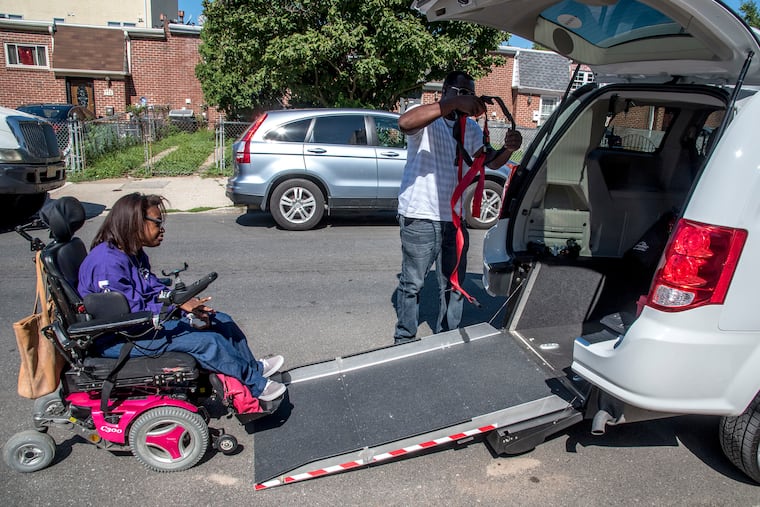Uber is discriminating against disabled riders, Pennsylvania lawsuit claims
A lawsuit in Pittsburgh is one of two that a national disability rights group has filed to demand better wheelchair access with Uber.

Uber and Lyft are required to keep at least 70 wheelchair-accessible vehicles active in Philadelphia all the time.
The companies have exceeded that number, according to the Philadelphia Parking Authority, and there are now 101 such vehicles operating in the city. Yet people who rely on the accessible vehicles say they still can’t count on rideshare the way the rest of the city can.
“I still have had trouble,” said Liam Dougherty, a disability rights activist with Liberty Resources in Philadelphia who uses a wheelchair. “The last Uber ride I took, the driver took about an hour to get to me.”
Uber says the average wait time for an accessible vehicle in Philadelphia is less than 15 minutes, but that’s still quite a bit slower than the standard five-minute wait the company promises able-bodied customers in the city.
>>READ MORE: Uber and Lyft’s wheelchair access grows, with room to improve
That difference is even greater in other cities, which has prompted a national disability rights organization to add Pennsylvania to the states it is challenging Uber to do better for disabled customers. California-based nonprofit Disability Rights Advocates filed a suit on behalf of four people in U.S. District Court for the District of Western Pennsylvania, the Pittsburgh Post-Gazette reported Thursday. The suit was filed Tuesday in collaboration with a Pittsburgh law firm, and the plaintiffs are seeking class-action status, the newspaper reported.
Disability Rights Advocates is pursuing a similar case in federal court in California, and the Post-Gazette reported similar cases are also underway in Chicago, New York, and Washington.
“We’re aware that this is an issue all over the country,” Michelle Iorio, a lawyer with the organization, said Friday. “We have just listened to what folks with disabilities are experiencing across the country.”
The lawsuit alleges that Uber is in violation of the Americans With Disabilities Act by failing to take steps to ensure that people in wheelchairs receive equal service from the company. It states that the company does not have any wheelchair-accessible vehicles available in Allegheny County, which includes Pittsburgh. All four plaintiffs in the case use wheelchairs and said they would benefit from having Uber service.
The suit seeks an injunction requiring Uber to provide equal service to people with disabilities, as well as attorney fees.
Uber declined to comment on the case, but the company’s business model largely depends on individual drivers choosing to use the Uber app, and they typically would not have a wheelchair-accessible vehicle.
>>READ MORE: Should Philly follow Boston and remake paratransit with ride hailing?
The requirement for Uber and Lyft to have a certain number of accessible vehicles in Philadelphia is unusual and is limited to Pennsylvania cities with a million people or more, the company reported Friday. An estimated 200,000 people in Philadelphia have mobility limitations. The requirement isn’t always effective either, Dougherty said, since there’s no mandate that those 70 or more accessible vehicles must operate for a certain period of time.
“There’s no guarantee that 70 people are active,” Dougherty said. “They may work once a week.”
Uber is partnered with a paratransit transportation company that uses the app as a dispatch tool in Philadelphia to improve service, and Philadelphia is one of a few cities worldwide where a specific wheelchair-accessible option is available to customers. The other cities are Chicago, Washington, New York City, Boston, Los Angeles, San Francisco, Portland, Phoenix, Houston, Austin, Toronto, Paris, as well as Bangalore, India, Newcastle, Australia, and in the United Kingdom, according to Uber’s website.
But even Philadelphia’s quota fails to meet the federal law’s requirement of equal service for people with disabilities, Iorio said.
“Equivalent service would mean there wouldn’t be longer wait times for someone with a disability,” she said.